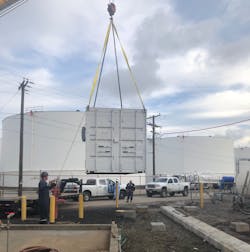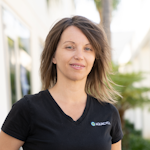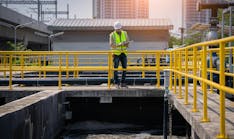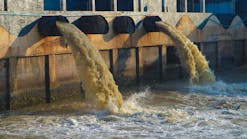Wastewater generated from operations at bulk storage terminals can include process wastewater, secondary containment wastewater and stormwater management. Dealing with these wastewater streams are usually not considered core to the business, but need to be carefully managed to avoid unpermitted discharges of harmful chemicals and petrochemicals to the environment. Permit violations result in large fines, negative publicity and, ultimately, potential disruption to operations.
One of the main sources of process wastewater is from cleaning operations — washing out tanks to facilitate changeovers or recover product. The primary contaminant from this stream is residues of hydrocarbons or whatever material was stored in the tank. Stormwater management presents different challenges, creating huge quantities of low-strength water. In either case, these are carefully regulated by local and national limits and require permit compliance and regular monitoring.
Challenges of managing wastewater
In the case where terminals have onsite wastewater treatment, many of these were installed decades ago and are starting to reach capacity limitations and are requiring upgrades. Aging wastewater infrastructure will create bottlenecks as terminals try to accommodate growth plans. At the same time, companies are facing increasingly strict emissions regulations which further challenge existing treatment systems. Add to this that the treatment plants take up space that could be used for expanding storage capacity, and the perception that wastewater is complicated and opaque, a bit of black box in terms of keeping treatment systems working as planned and requiring specialized knowledge that may not be readily available.
For terminals that do not have onsite treatment, the only option for handling these streams is to haul offsite for disposal which can be costly and unsustainable.
Consider this trifecta of wastewater: a non-core part of the business, that costs money and takes up space, requires specialized staff and carries permit and financial risk if anything goes wrong.
Demonstrating the effectiveness of new sustainable wastewater treatment
Vopak is the world's leading tank storage company, committed to storing vital products with care. Central to their strategy is the transition to low-carbon fuels and minimizing the impact of business activities on people’s safety, health and wellbeing and on the environment.
This commitment to innovation and sustainable infrastructure was the driver for working with Aquacycl to validate Aquacycl’s BioElectrochemical Treatment Technology (BETT) to treat wastewater from hydrocarbon storage to achieve permit discharge compliance.
Treating wastewater in a small footprint, low-energy way
Aquacycl’s BETT system provides a sustainable wastewater management for challenging industrial wastewaters. The system operates with very low power consumption and generates direct electricity, reducing energy consumption by 40% and mitigating up to 50% of greenhouse gases that would otherwise be generated by use of conventional approaches. Aquacycl provides wastewater treatment as a service, with mutually agreed KPIs and includes real-time remote monitoring and control, regular maintenance, repair and annual sludge management.
The BETT systems use natural bacteria to clean the wastewater, reduce sludge and produce direct electricity (no methane). Locally sourced bacteria break down organic matter in the wastewater and release electrons during their natural process of respiration. The released electrons are captured as direct current and can be used to offset the power consumption of the system.
The system at Vopak was evaluated under different operating conditions over four months, including a stress test which added tank sludge and concentrated ether (both of which are currently being hauled away) to estimate the maximum removal rate.
During the operational period, Aquacycl and Vopak monitored a wide variety of parameters to test effectiveness. These included: pH, flow rate, conductivity and temperature, chemical oxygen demand (COD), total suspended solids (TSS), hydrocarbons, aromatics, alcohols and heavy metals.
Achieving permit compliance in a treatment system the size of a school bus
The discharge permit limit for the site is 510 mg/L COD and 30 mg/L of TSS, which the BETT system consistently met. The system achieved a maximum COD removal of 92 percent in an 8-hour hydraulic residence time (HRT); and an average removal of 74 percent over the duration of operation at an 18-hour HRT. It achieved a maximum TSS removal of 73 percent at a 12-hour HRT, and an average of 46 percent over an 18-hour HRT.
For the stress test, tank sludge was added, and 70 percent of total COD was removed in 18 hours with no disruption to the BETT system. Subsequently, 30,000 ppm of ether was added. Eighty percent of the ether concentration was removed in 18 hours with no disruption to the BETT system.
The hydrocarbon removal activity exceeded expectations, as BETT was able to consistently achieve over 90 percent removal of all aromatic compounds, most long-chain hydrocarbons and ethers. The regulated compounds detected in incoming wastewater included phenol, nonylphenol, acetone, acetophenone and octadecane.
Aquacycl and Vopak validated that the BETT system can treat terminal wastewater to permitted discharge levels. Additional sustainability benefits included: a 50 percent reduction in greenhouse gas emissions during treatment; a 40 percent-plus reduction in energy costs for treatment; and a 90% reduction in secondary sludge generated during treatment.
In addition, the hands-off nature of the service provides guaranteed permit compliance without investing in resources to manage the system. The modularity and flexibility of the system enables Vopak to treat side streams that cannot be handled by existing treatment or to support growth initiatives.
What is next for the industry?
In an industry shifting toward low-carbon fuels, terminal companies are rethinking all aspects of their operations to identify opportunities for new technologies that can help achieve both cost savings and bring environmental benefits. Leading companies like Vopak are recognizing the value embedded in wastewater and adopting new technologies for managing these waste streams.
Dr. Sofia Babanova is the CTO and co-founder of Aquacycl and leads the interdisciplinary team of engineers, researchers and service personnel conducting development and operation of biological, electrochemical and bioelectrochemical systems for wastewater treatment and purification.
Aquacycl




